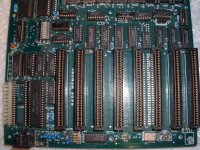bugman2112
Experienced Member
Just purchased a Jameco clone board with an NEC v20. Anyone have experince with this motherboard? I purchased it mainly as a backup board, and I always wanted to check out that NEC v20 chip. I'm curious if it came stock with the nec, or if that was added. They are pin compatable, right? So I should be able to put a 8088 back in at any time? I read that the nec is not 100% software compatable. What is nice is that it comes with a manual as well. I also noticed that this clone board, as well as most that I see for sale, is missing one of the two ROMS. I'm assuming that is the BASIC ROM to avoid copyright infringements? I doubt missing that chip would cause any compatability problems, expect of course if something like BASICA calls on the ROM. I don't think much software made calls to those routines?

